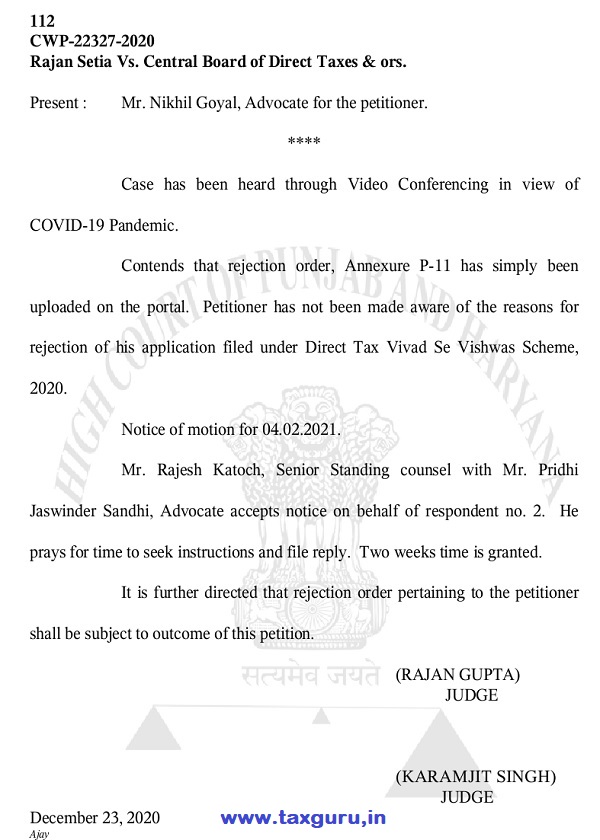Sh. Rajan Setia v. Central Board of Direct Taxes and another (2020) was presented before the Hon’ble Punjab and Haryana High Court on 23.12.2020, represented by Advocate(s) Nikhil Goyal and Rana Gurtej Singh challenging the constitutional validity of Section 9 sub-section (a)(ii) of the Direct Tax Vivad se Vishwas Act, 2020 and clarifications given by the Central Board of Direct Taxes vide Circular No. 9/2020 and Circular No. 21/2020 regarding eligibility Taxpayers under the Scheme.
Case Details – Rajan Setia Vs. Central Board of Direct Taxes & ors. (High Court of Punjab & Haryana); CWP-22327-2020;23/12/2020
Case Status – Notice of Motion to CBDT, PCIT(C), Ludhiana and Union of India. Stay Granted against the rejection of application by PCIT(C), Ludhiana subject to outcome of the CWP.
Vivad se Vishwas Scheme
On 1st February 2020, the Hon’ble Finance Minister, Mrs. Nirmala Sitharaman announced the Direct Tax Vivad se Vishwas Scheme during her speech for the Budget 2020. Th Scheme was introduced to reduce to the pending income tax litigations present at multiple appellate forums and for more efficient collection of revenue.
The Bill was then approved on 4th March 2020 by the Lower House of the Parliament. On 17th March 2020 the Bill became an Act on approval by the President of India. The Rules regarding the same came into place dated 18th March 2020.
Facts
The facts of the case are such, that, prosecution has been instituted against the assessee in the same Assessment Year, but it is not related to the Tax Dispute sought to be settled under the scheme.
Issue
Circular No. 21 of 2020 by the Central Board of Direct Taxes where, clarification in the form of FAQs have ben provided. Question No. 73 of the Circular states as follows –
“Question No. 73. In the case of a taxpayer, prosecution has been instituted for A.Y. 2012-13 with respect of an issue which is not in appeal. Will he be eligible to file declaration for issues which are in appeal for this A.Y. and in respect of which prosecution has been launched?
Answer: The ineligibility to file declaration relates to an assessment year in respect of which prosecution has been instituted on or before the date of declaration. Since in this example, for the same assessment year (2012-13) prosecution has already been instituted, the taxpayer is not eligible to file declaration for this assessment year even on issues not relating to prosecution.”
Thus CBDT has interpreted Section 9 sub-section (a)(ii) of the Act to exclude all cases where prosecution has been instituted on or before of the date of such declaration under the Act.

Arguments advances in the CWP
Section 9 sub-section (a)(ii) of the Direct Tax Vivad se Vishwas Act, 2020 (‘DTVSV’) and the accompanying circulars are being prayed to be declared as unconstitutional and ultra vires the parent act i.e. Direct Tax Vivad se Vishwas Act, 2020, for the below mentioned reasons:
1. The Legislation is not intended to advance a blanket immunity – The Long Title of the Act reads An Act to provide for resolution of disputed tax and for matters connected therewith or incidental thereto.
Further, under Section 6 of the DTVSV immunity from initiation of proceedings in respect of offence and imposition of penalty is limited to the ‘Tax Arrear’ being settled under the Scheme.
Therefore, exclusion of cases where the Prosecution vide Section 9(a)(ii) does not relate to the ‘Tax Arrear’ being sought to settled, creates an arbitrary exclusion of a class of Taxpayers who by design of the legislation will not otherwise get an immunity or concession with respect to the Prosecution in the unrelated/ unconnected matter.
2. Narrow interpretation of legislation by delegated powers – A beneficial construction of Section 9(a)(ii) advances the interpretation that the exclusion of Taxpayers is limited to Assessment Years where the prosecution relates to the Tax Arrear sought to settled under the DTVSV Scheme.
However, CBDT in its Circular No. 21/2020 dated December 04, 2020 narrowed the interpretation of Section 9(a)(ii) excluding the Taxpayers from the Scheme even if the prosecution in a particular Assessment Year does not relate to the Tax Arrear being settled.
This interpretation of the Act by the CBDT less than a month before its closure, creates an unnecessary burden for Taxpayers whose cases might relate to institution of prosecution for non-deposit of TDS etc. which unfairly excludes them from the benefit of an amnesty legislation introduced to reduce litigation related to Tax Matters.
3. Exclusionary trigger at Institution of Prosecution instead of Adjudication
Notwithstanding the argument above, the exclusion of Taxpayer merely on institution of a Prosecution without any Adjudication in the Court of Law is arbitrary and excessive and unfair to the rights of Taxpayers where the instituted prosecution is later disposed with an acquittal.
4. No hearing afforded/ opportunity to defend against Rejection of Application
The Application for availing the Scheme filed by the Petitioner has been rejected by the PCIT(C), Ludhiana without a proper order or giving any information about the cause of rejection. Further, there was no opportunity of being heard afforded, in violation of the Principles of Natural Justice.




